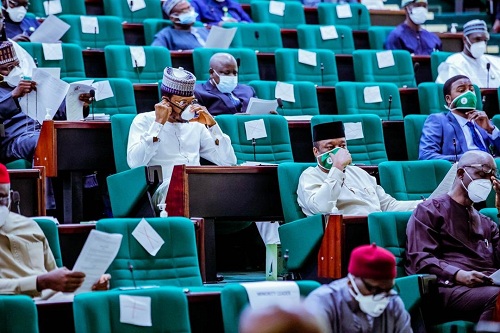This post has already been read 1086 times!
•FAAN generates N30 billion, remits N2 billion in nine months
The House of Representatives’ Committee on Aviation, yesterday, directed the Federal Airports Authority of Nigeria (FAAN) to channel at least 70 per cent of its aviation investments at improving airports’ critical infrastructure nationwide.
The committee on a tour of the aviation agencies in Lagos said improved attention at aeronautical and non-aeronautical facilities were most critical to security and safety.
This is coming as FAAN gave an account of its 2020 earnings, disclosing that it earned, at least, N30 billion between January and September, with only N2 billion remitted into the Consolidated Revenue Fund (CRF) account.
Chairman of the Committee, Nnolim Nnaji, said paying strategic attention to airport infrastructure and driving investment were most critical at this period of a global pandemic and economic downturn.
“You have to find a way to put up a strategy on how to focus on the safety and security of the airports. The airport terminals can be well contained. What is important for airlines operators is to land in a safe airport with good security, good runways, airfields lightening, operational and perimeter fence that guarantees the safety and insurance of their aircraft.
“The essence of preparing for the future just happened to us (with the pandemic and economic recession). Let your future begin today. You have to prepare for any situation, nobody expected this kind of situation we find ourselves in but it is a lesson to all of us that we have to prepare for any eventuality and in doing so we need to go into aggressive infrastructure development in areas of non-aeronautical aspects of the industry,” Nnaji said.
The lawmakers hinted that provisions of the new aviation industry bill, currently before the house, would be friendly to staff of the agencies, airline operators, and the industry at large when passed into law.
They also pledged to support the industry with the necessary legislation. Among these is the push for the retention of 25 per cent of FAAN’s generated revenue, “to enable the Authority put in place a 10-year development plan and use the funds to build critical infrastructure for the aviation industry”.
Managing Director of FAAN, Capt. Rabiu Yadudu, told the lawmakers that as at September 30, 2020, FAAN generated a total of N30, 084, 235, 670, during the nine months target, out of which N27, 967, 455, 341 was the actual collection.
“From this amount, N17, 610, 732, 427 was from aeronautical sources of revenue; N5, 776, 622, 874 from non-aeronautical sources and N5, 242,434,128 recovered from outstanding debts owed.
“From January to September 2020, the revenue target of the aeronautical source was N38, 988, 439, 354 and actual generation totalled N17, 823, 332,992, out of which N17, 610, 732, 478 is actual collection giving a percentage performance of 98.81 on revenue collected over generated.
“The Authority is shifting focus from aeronautical sources of revenue to non-aeronautical. FAAN is presently operating at only about 30 per cent of its pre-COVID capacity. The Authority has set up a revenue task force to aggressively drive revenue, follow up on outstanding debts owed and explore all possible investment opportunities,” Yadudu said.
He called on the lawmakers to give accelerated attention to the agency’s budget, and expedite action on legislation that would help the agency fast track its operations across the airports.
He said he was mindful of the Committees’ efforts at ensuring that FAAN is exempted from payment of operating surplus to the Federal government.
“Exemption of FAAN will guarantee that the revenue generated by the airports is transparently reinvested wholly in operating and developing airports’ facilities in compliance with International Civil Aviation Organisation (ICAO) standards and recommended practices on airport generated revenue.
“Nigeria is expected to be a hub in West/Central African regions. This can only be met through more funding for the provision of modern infrastructure and technology. This we believe can only be achieved with your support.
“The aviation agencies will urgently need intervention funds from the Federal government to address infrastructural gaps and position the industry for better service delivery and contribution to the national economy. On this note, we seek your assistance in this area and the other aforementioned areas,” Yadudu said.



